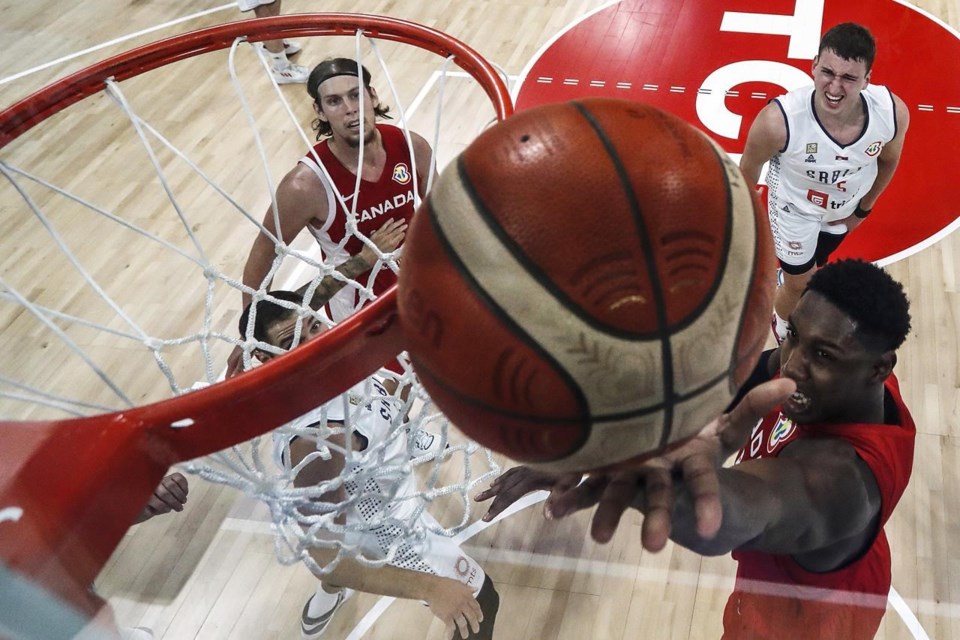Canada's men's basketball team has accomplished its highest-ever finish at a men's World Cup, but staff and players are aiming to take those first-time accomplishments a step further: a medal.
The Canadians fell 95-86 to Serbia in the semifinals as the team's bid to make the World Cup final fell short.
Instead, they will meet the United States on Sunday for the bronze medal.
"I know this is emotional for everybody, but I know these guys will do whatever it takes to get that medal," said Canada head coach Jordi Fernandez.
RJ Barrett scored 23 for Canada in the loss, with early foul trouble for Shae Gilgeous-Alexander, Dillon Brooks and Kelly Olynyk limiting their offensive push as the game went on.
Canada finished the game with 25 personal fouls to Serbia's 22.
"We just didn't guard anybody, and if you don't guard anybody at any level, you don't get to win," said Fernandez about his team's defensive performance. "That's what we have to learn for the next game, we have to defend and we have to do it as a team. If we do that, we give ourselves a chance."
Barrett said he and his teammates have a clear goal.
"We gotta leave here with a medal," he said.
Fernandez offered a larger view about Canada's growth as a basketball program, and what a medal would mean to players and fans.
"It means the world for our people at home, for these guys here … just to go back home with a medal is a great accomplishment. None of these guys have been in that position," he said. "To win it, it means we fought for something but we know that we can still be better. We want to leave this tournament hungry and thirsty, and build this program all the way to the top."
Both Canada and the United States have struggled playing against teams more experienced at the FIBA level and its style of play.
"One of the things you know I've always preached about is you can have all the talent in the world, but you got to have experience at the FIBA level," said former Canadian head coach and player Leo Rautins.
Rautins pointed out several differences NBA players face when playing at the FIBA level, including refereeing.
"The officiating is different. The officiating can be crazily inconsistent. There's bias, there's inconsistency, there's just bad officiating sometimes. And what happens is the international players handle that. NBA players don't."
The difference between the NBA and FIBA style of play could also prove beneficial to the Canadians, Rautins added.
"I know this sounds crazy, but I always felt that we always matched up best with the U.S. simply because we were both playing a North American game," he said with a laugh. "It's a favourable game where both teams, I think, will feel more comfortable playing against each other than they will against international teams."
United States point guard Jalen Brunson, who finished with 15 points and seven assists in Friday's 113-111 upset loss to German, was succinct in his assessment of his performance, calling it "terrible. Plain and simple."
The New York Knicks star acknowledged the pressure he and his teammates face entering international competitions.
"We're expected to win year in and year out. We're expected to win because of the history USA Basketball has had," Brunson said. "I think for us, we didn't come ready to play from the start."
He added that the team would use the loss as fuel in the bronze-medal match against Canada.
There's been only one instance — 1963 and 1967 — when the Americans failed to medal in consecutive World Cups, adding to the pressure.
The U.S. was seventh at the World Cup four years ago
Rautins agreed with Brunson's assessment, and said he views it as something Canada can use in preparing for the bronze-medal tilt.
"Every time the United States steps on the floor, the pressure is immense. The expectation is you're going to win gold every time you step on the floor," he said.
This report by The Canadian Press was first published Sept. 8, 2023.
Nick Wells, The Canadian Press



